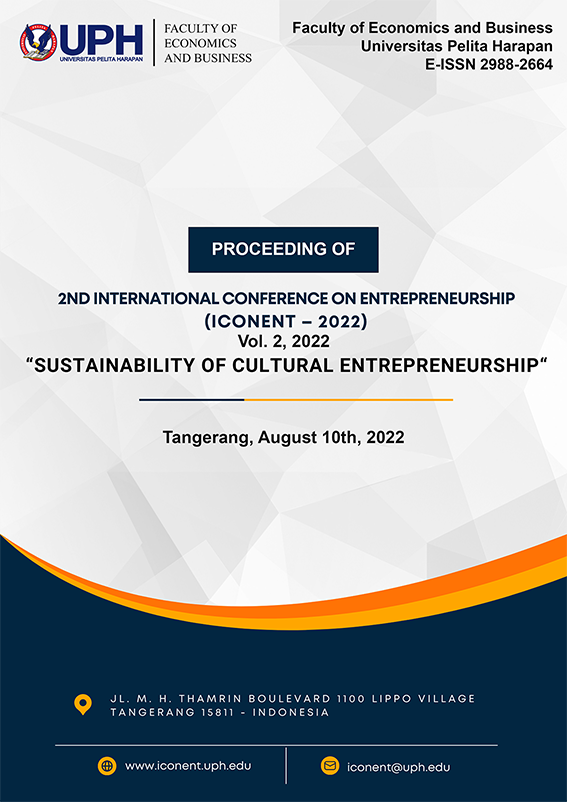FINANCIAL LITERACY ASSISTANCE FOR VILLAGE BUSINESS: CASE STUDY IN SITIO TAMALE, THE PHILIPPINES
Keywords:
Financial Literacy Assistance, Village Business, EntrepreneurshipAbstract
A business really needs adequate records to evaluate business operational activities and determine future improvement steps. 30 Youths in Sitio Tamale Village, Philippines have developed a Mushroom Business which took place since October 2021. The Research Team was entrusted with two modules consisting of series A and B and aiding answer the need for mushroom Business development in the village. Module A on financial literacy knowledge and Module B on the technical steps of making financial reports are solutions to these needs. By presenting material that is practical knowledge and active interaction through filling out modules related to financial literacy, the training team explained via Google Meets to participants. The results of the assistance showed that 33% of participants understood very well, 37% of participants understood and 30% were neutral. There are several obstacles such as internet access, data processing technology capabilities, educational background, and commitment to be the main factors in this training. There are several key issues including challenges, risks, and further opportunities for village business. This financial literacy assistance could be an incubator to effectively oversee the business health.
References
Ali, MM, Rattanawiboonsom, V., Perez, CM, & Khan, AA (2017). Comparative Positioning of Small and Medium Enterprises in Bangladesh, Thailand and the Philippines. Economy of Region , 13 (2), 381-395. https://doi.org/10.17059/2017-2-5
Anwar, M., Shuangjie, L., & Ullah, R. (2020). Business Experience or Financial Literacy? Which One is Better for Opportunity Recognition and Superior Performance? Business Strategy and Development , 3 (3), 377-387. https://doi.org/10.1002/bsd2.103
Asian Development Bank. (2020). Asia Small and Medium-Sized Enterprise Monitor 2020: Volume I-Country and Regional Reviews (Vol. 1, Issue October). https://www.adb.org/publications/asia-sme-monitor-2020-country-regional-reviews%0Ahttps://www.adb.org/sites/default/files/publication/646146/asia-sme- monitor-2020-volume-1.pdf%0Ahttps://www.adb.org/publications/asia-sme-monitor-2020-country-regional-revie
De Saulles, M. (2007). Information Literacy amongst UK SMEs: An Information Policy Gap. Aslib Proceedings: New Information Perspectives , 59 (1), 68-79. https://doi.org/10.1108/00012530710725214
Department of Trade and Industry. (2020). 2020 MSME Statistics . Department of Trade and Industry of the Republic of the Philippines. https://www.dti.gov.ph/resources/msme-statistics/
Eniola, AA, & Entebang, H. (2017). SME Managers and Financial Literacy. Global Business Review , 18 (3), 559-576. https://doi.org/10.1177/0972150917692063
Francisco, JP, & Canare, TA (2019). The Challenges to SME Market Access in the Philippines and the Role of Business Associations . https://apfcanada-msme.ca/sites/default/files/2019- 01/The Challenges to SME Market Access in the Philippines and the Role of Business Associations_edited.pdf
Hussain, J., Salia, S., & Karim, A. (2018). Is Knowledge that Powerful? Financial Literacy and Access to Finance: An Analysis of Enterprises in the UK. Journal of Small Business and Enterprise Development , 25 (6), 985-1003. https://doi.org/10.1108/JSBED-01-2018-0021
Imarhiagbe, BO, Saridakis, G., & Mohammed, AM (2017). Do Bank Credit Rejection and Financial Education Affect Financial Self-Confidence? International Journal of Entrepreneurial Behavior and Research , 23 (6), 1033-1051. https://doi.org/10.1108/IJEBR-05-2016-0168
International Council for Small Business. (2019). ICSB Annual Global Micro-, Small, and Medium-Sized Enterprises Report . https://icsb.org/wp-content/uploads/2019/09/REPORT-2019.pdf
Li, R., & Qian, Y. (2020). Entrepreneurial Participation and Performance: The Role of Financial Literacy. Management Decisions , 58 (3), 583-599. https://doi.org/10.1108/MD-11-2018-1283
Markova, T., Glazkova, I., & Zaborova, E. (2017). Quality Issues of Online Distance Learning. Procedia - Social and Behavioral Sciences , 237 (June 2016), 685-691. https://doi.org/10.1016/j.sbspro.2017.02.043
Nalukenge, I., Nkundabanyanga, SK, & Tauringana, V. (2012). Literacy, External User-Pressure and Quality of Accounting Information of Ugandan SMEs. In Research in Accounting in Emerging Economies (Vol. 12, Issue PARTA). Emerald Group Publishing Ltd. https://doi.org/10.1108/S1479-3563(2012)000012A007
Nkundabannyanga, SK, Kasozi, D., Nalukenge, I., & Tauringana, V. (2014). Lending Terms, Financial Literacy and Formal Credit Accessibility. International Journal of Social Economics , 41 (5), 342-361. https://doi.org/10.1108/IJSE-03-2013-0075
Okello, GCB, Ntayi, JM, Munene, JC, & Malinga, CA (2017). The Relationship between Access to Finance and Growth of SMEs in Developing Economies: Financial Literacy as a Moderator. Review of International Business and Strategy , 27 (4), 520-538. https://doi.org/10.1108/RIBS-04-2017-0037
Rasheed, R., & Siddiqui, SH (2019). Attitude for Inclusive Finance: Influence of Owner-Managers' and Firms' Characteristics on SMEs Financial Decision Making. Journal of Economic and Administrative Sciences , 35 (3), 158-171. https://doi.org/10.1108/jeas-05-2018-0057
Susan, M. (2020). Financial Literacy and Growth of Micro, Small, and Medium Enterprises in West Java, Indonesia. International Symposia in Economic Theory and Econometrics , 27 , 39-48. https://doi.org/10.1108/S1571-038620200000027004
Webster, B., Walker, E., & Barrett, R. (2005). Small Business and Online Training in Australia: Who is Willing to Participate? New Technology, Work and Employment , 20 (3), 248-258. https://doi.org/10.1111/j.1468-005X.2005.00157.x
Widayanti, R., Damayanti, R., & Marwanti, F. (2017). The Effect of Financial Literacy on Business Sustainability in MSMEs in Jatisari Village. Scientific Journal of Management & Business , 18 (2), 153. https://doi.org/10.30596/jimb.v18i2.1399
World Bank. (2021). Small and Medium Enterprises (SMEs) Finance: Improving SMEs' Access to Finance and Finding Innovative Solutions to Unlock Sources of Capital. Worldbank.Org. https://www.worldbank.org/en/topic/smefinance

 Fakultas Ekonomi dan Bisnis | Universitas Pelita Harapan | Kampus Universitas Pelita Harapan | Gedung F Lt. 12 | Lippo Karawaci, Tangerang - 15811 | Telp 021-5460901 | Fax 54210992
Fakultas Ekonomi dan Bisnis | Universitas Pelita Harapan | Kampus Universitas Pelita Harapan | Gedung F Lt. 12 | Lippo Karawaci, Tangerang - 15811 | Telp 021-5460901 | Fax 54210992